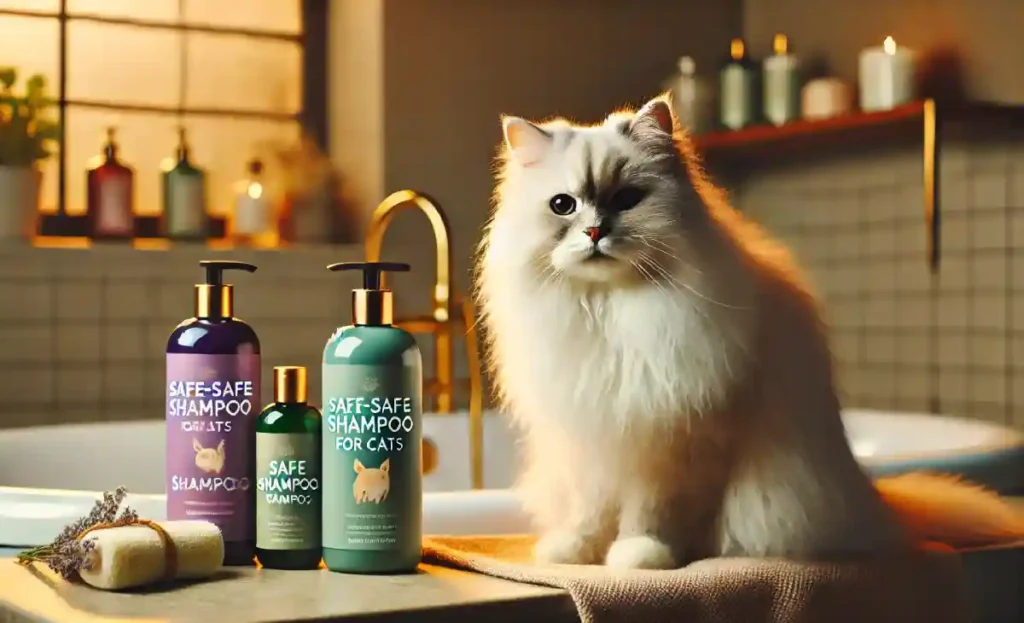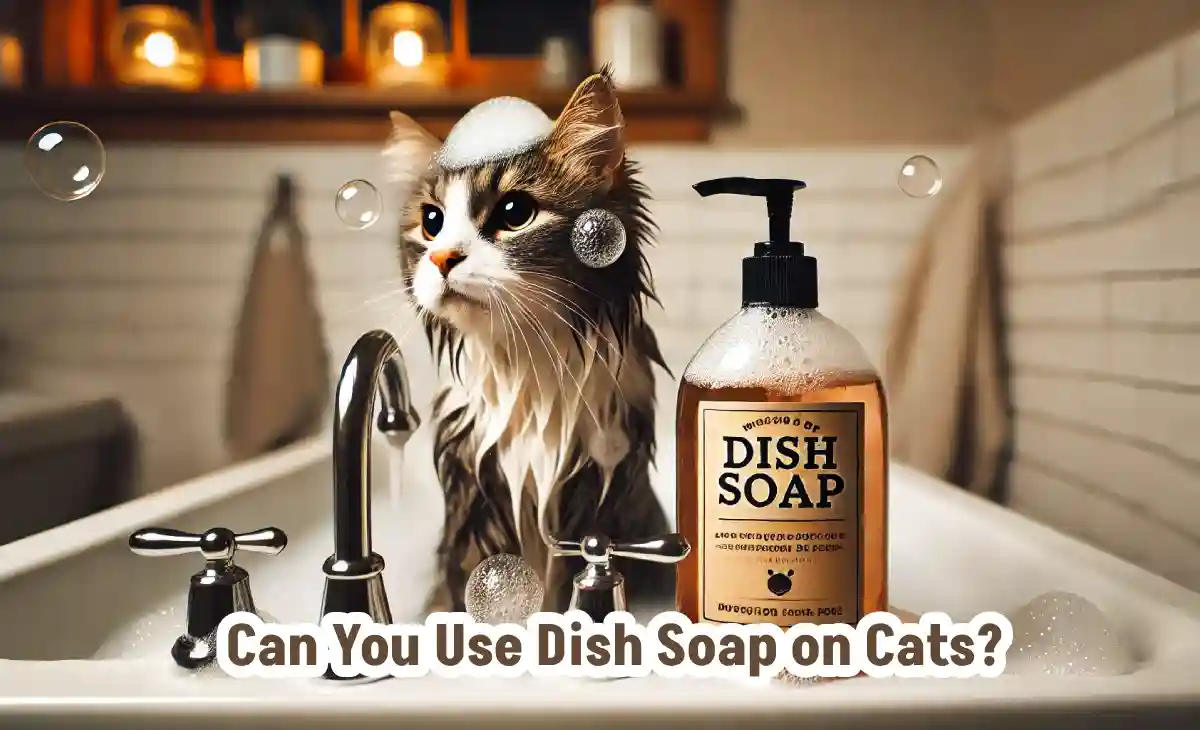Did you know cats have skin that’s more sensitive than most other pets? Their unique needs mean that the products we use on them require extra care. Many pet owners wonder if dish soap, commonly found at home, is safe to use in a pinch.
However, using dish soap on cats can have surprising consequences. Let’s explore whether it’s safe and what alternatives exist to keep your cat clean and comfortable.
Why Some People Use Dish Soap on Cats?
In some cases, pet owners consider dish soap for its grease-cutting power and easy availability. When cats accidentally get into sticky or greasy substances, people often think of dish soap as a quick fix. Dish soap is strong enough to cut through oil, so it seems like it would work for heavy dirt on a cat’s coat.
But dish soap is not designed for pets. Its ingredients target food residues and grease, which differ from the dirt that can cling to a cat’s fur. When used on a cat, these strong chemicals may create more problems than they solve. Dish soap’s powerful grease-cutting ability strips natural oils from the skin and can lead to dryness, itching, and other skin issues.
Is Dish Soap Safe for Cats?
Dish soap contains chemicals that help break down food and grease. However, many of these ingredients can irritate a cat’s skin. For example, dish soaps often include sulfates, which dry out skin.
Cats naturally have oils that protect their skin and coat, and these sulfates can strip away these oils, leading to discomfort and irritation.
Potential Risks of Using Dish Soap on Cats:
Using dish soap on a cat can lead to a range of problems. Dryness and irritation are common side effects, as is itching. Some cats may even develop rashes or other allergic reactions. Unlike shampoos made for cats, dish soaps contain no ingredients to protect sensitive skin. Without these, cats experience discomfort, and prolonged use of dish soap can worsen the condition.
It’s important to remember that cats also groom themselves by licking their fur. Any leftover dish soap could be ingested by the cat, leading to digestive issues. For a thorough look into safe grooming products for pets, this pet care guide provides useful information.
Alternatives to Dish Soap for Cats

If you need to clean your cat, safer alternatives exist. Cat-safe shampoos and pet wipes provide options that respect a cat’s sensitive skin. These products include ingredients that keep your cat’s coat clean without stripping away natural oils.
Using Cat-Safe Shampoo:
Pet shampoos labeled as “cat-safe” contain no harmful chemicals and are mild on the skin. Most brands use ingredients that clean fur while preserving essential oils. This makes cat-safe shampoo ideal for cats who need a full bath. Just a small amount can keep your cat’s fur clean and free from dirt.
Pet Wipes for Quick Cleanups:
For smaller messes, pet wipes can be a convenient choice. These wipes are pre-moistened and contain safe ingredients, so they won’t harm your cat’s skin. They work well for cleaning a specific area, like a dirty paw or a spot on the coat, and avoid the stress of a full bath. Many pet wipes also have mild fragrances that keep your cat smelling fresh without strong perfumes that could irritate them.
How to Clean Your Cat Safely?
Cats can be challenging to bathe, but with the right approach, the process becomes easier. Knowing how to bathe your cat properly reduces stress and keeps your cat comfortable.
Steps for a Safe Cat Bath:
1. Prepare the Water: Use lukewarm water, filling the sink or tub to a low level. Avoid using cold water, as this can shock or discomfort your cat.
2. Wet the Fur Gently: Start by wetting the cat’s fur gradually. Use a cup or small container to pour water, avoiding the cat’s face.
3. Apply Cat Shampoo: Rub a small amount of cat-safe shampoo into the fur. Work it through, being careful not to get it into sensitive areas like the eyes or ears.
4. Rinse Thoroughly: Make sure you rinse all shampoo out of the coat. Any leftover shampoo may cause irritation and lead to excessive grooming.
5. Dry Carefully: Pat your cat dry with a towel. Try to avoid using a blow dryer, as most cats find it loud and stressful.
Keeping Your Cat Calm During a Bath:
Bathing a cat can be stressful for both of you. Speak to your cat in a calm voice, and avoid sudden movements. Having everything ready before you start will make the process smoother.
You may also use a non-slip mat to give your cat a stable surface, reducing anxiety during the bath.
FAQs
Can dish soap kill fleas on cats?
Dish soap can kill fleas by breaking down their outer layer. However, it may irritate your cat’s skin. Flea treatments designed for cats work better and keep your cat safe from side effects.
What should I do if my cat has an allergic reaction to dish soap?
If your cat shows redness, itching, or any sign of discomfort after using dish soap, rinse them with water. Then, consult your veterinarian for advice. In some cases, an allergy may require a medicated shampoo or treatment.
How often should I bathe my cat?
Most cats clean themselves and rarely need baths. Bathing once every few months is often enough unless the cat gets into something dirty. If your cat has a skin condition or gets extra dirty, use a vet-approved shampoo for safe cleaning.
Are human soaps safe for cats?
No, human soaps are too harsh for a cat’s skin. They can lead to dryness and irritation. Always choose products labeled as cat-safe to protect your pet’s sensitive skin.
Conclusion
While dish soap may seem like a quick fix for cleaning your cat, it can lead to skin issues and discomfort. Instead, choose products that are specifically designed for cats, like cat-safe shampoos and pet wipes.
These options clean effectively without the risks dish soap carries. Keeping your cat clean with safe products keeps their skin healthy and helps them stay comfortable.




